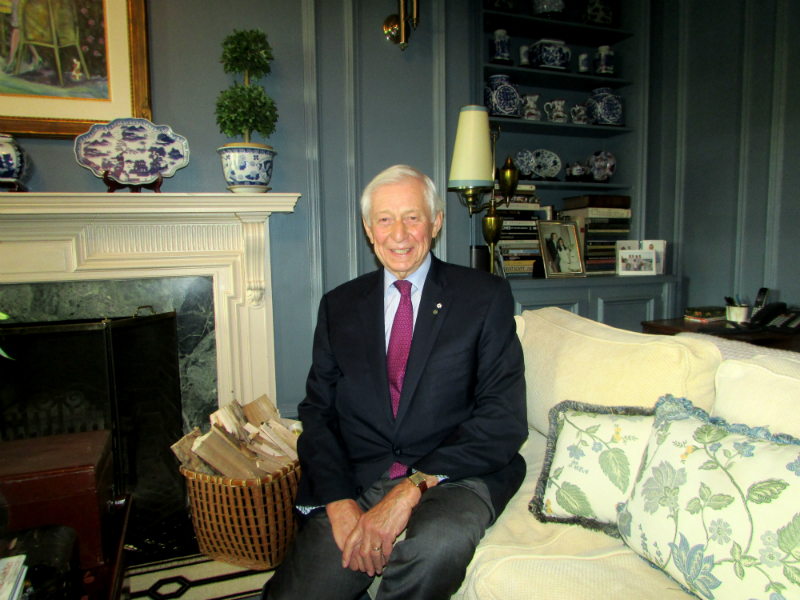In his nearly 15 years on the province’s highest court, Joseph Nuss heard all sorts of civil, commercial and criminal cases.
“It could be bankruptcy one day and divorce another, even murder, anything that was appealable,” said Nuss, a judge on the Quebec Court of Appeal from 1995 until his mandatory retirement in 2009.
Decisions were rendered on everything from indigenous treaty rights, to charter challenges, to the colour of margarine, but in most cases, money was at the heart of the dispute.
Nuss, who was appointed to the bench by the federal government after more than three decades as a litigation lawyer, has been recognized for his distinguished professional career and communal service by the country he was born in 85 years ago.
On June 27, Nuss’s appointment as a member of the Order of Canada was announced “for his lifelong commitment to justice, and for supporting Montreal’s Jewish community.”
Despite the height he reached, Nuss never sought the limelight and he’s taken aback by the honour.
“The Order of Canada symbolizes a wonderful democracy, which cherishes the rule of law and guarantees the protection of human rights and freedoms,” he said. “I am deeply honoured and gratefully recognize that it is also a tribute to my parents, family, friends, teachers and colleagues whose love, encouragement and loyal support is so important to me.”
Nuss was born in Montreal to Hungarian immigrants and graduated from the storied Baron Byng High School. His parents opened a small dry goods store at the corner of Pine Avenue and St-Dominique Street, which the family lived above.
Nuss was a bright student and always wanted to be a lawyer, as his 1951 yearbook entry attests.
READ: PAINTING IS TRIBUTE TO ARTIST AND DONOR’S HUSBANDS
Before law school, he obtained a BA from McGill University, majoring in literature, which exposed him to such legendary teachers as poet Louis Dudek. Throughout his time at McGill, Nuss was active in the debating society, of which he served as vice-president while one Leonard Cohen was president.
After a year’s study on a scholarship in Italy, in 1961, Nuss went to work for John Ahern, who he describes as, “One of the foremost barristers in Quebec. He was my mentor.” The law firm was later named Ahern Lalonde Nuss Drymer.
Nuss was counsel on a number of federal commissions of inquiry, including those into illegal activities by the RCMP Security Service in the 1970s that led to the formation of CSIS, and the bizarre case in the ’80s of a Red Brigade terrorist who Italy wanted Canada to extradite.
Nuss was the fourth Jew on the Quebec Court of Appeal. The first was Fred Kaufman, followed by Melvin Rothman and Morris Fish, who went on to the Supreme Court, and Henry Steinberg, who served only two years before his premature death. Nuss replaced him.
One of the most newsworthy cases Nuss decided was between former Parti Québécois premiers Lucien Bouchard and Jacques Parizeau, and Montreal investment counsellor Richard Lafferty.
The matter had been in the courts for years after the politicians sued Lafferty for defamation for comparing them to Hitler in a 1993 newsletter to his clients.
In 2000, the Quebec Superior Court awarded Bouchard and Parizeau $20,000 each. They appealed, claiming it was not enough. Lafferty also appealed.
In 2003, Nuss and his colleagues upheld the lower court ruling and increased the damages to $100,000 each, which Bouchard and Parizeau said they would donate to charity.
In community affairs, Nuss was most notably associated with the Canadian Friends of the Alliance Israélite Universelle, an organization founded in 1860 in Paris to defend the rights of Jews around the world. It was responsible for establishing French-language Jewish schools in North Africa and the Middle East. Nuss was active in the organization from the early 1980s until he was appointed to the bench, including serving as its president for a time.
This brought Nuss in close contact with the growing Sephardic community in Quebec. He helped establish some of its institutions and was on Ecole Maïmonide’s board of directors.
In the late ’60s and ’70s, Nuss was part of Canadian Jewish Congress’ Le fait français project, which promoted the use of French, a language he had mastered.
With Irwin Cotler, Nuss was an intervenor at the Supreme Court in the Jim Keegtra hate speech and Imre Finta war crimes cases.
Right after his retirement from the bench, Nuss joined Woods LLP, a “litigation boutique,” where he is a senior counsel, concentrating on domestic and international arbitration and mediation.
While on the court, Nuss joined fellow judge Louise Otis in the initiation of a voluntary judicial mediation program – one of the first in the world – that has since been adopted by, not only all Quebec courts, but others in Canada and around the world.
“It saves time, money and stress,” said Nuss of mediation, which he has been invited to speak about at a number of international lawyers conferences.
